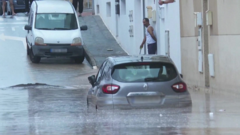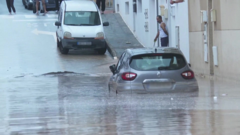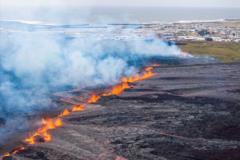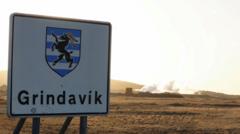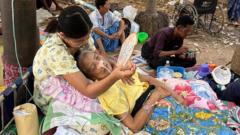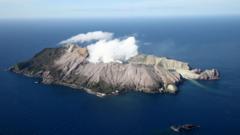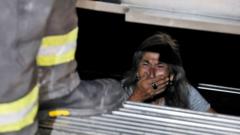With ongoing seismic activity confusing experts and alarming residents, strong earthquakes on Santorini have led to government declarations and the evacuation of three-quarters of the island's population. Scientists remain uncertain about the duration and future of this unusual situation.
Ongoing Seismic Activity in Santorini: Experts Warn of Uncertainty Ahead
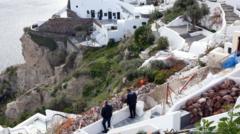
Ongoing Seismic Activity in Santorini: Experts Warn of Uncertainty Ahead
The Greek island of Santorini faces an unprecedented seismic crisis as thousands of earthquakes occur, prompting evacuations and a state of emergency.
In recent days, the serene atmosphere of Santorini, a favored destination for global tourists, has been shaken by a series of earthquakes culminating in a 5.2 magnitude quake on Wednesday. This seismic swarm has resulted in about 75% of the island's 15,000 residents evacuating, with authorities declaring a state of emergency in light of the ongoing crises.
Residents like Georgia Nomikou have taken precautions, moving their mattresses into living rooms as they brace for potential impacts from continuous seismic activity. Experts, including Dr. Athanassios Ganas from Athens' National Observatory, describe the situation as "extremely intricate" and unprecedented in modern times in Greece, prompting a wave of interest and concern from both locals and scientists.
While Santorini rests on the Hellenic Volcanic Arc, it has not experienced a major eruption since the 1950s. This raises questions among experts regarding the origins of the current seismic disturbances. The unusual cluster of earthquakes lacks the typical patterns seen in mainshock-aftershock sequences, leading to hypotheses about a potential awakening of volcanic activity, a phenomenon marked by increased seismic activity.
Dr. Margarita Segou from the British Geological Survey characterized the earthquake patterns as occurring in daily "pulses." However, predicting their duration remains challenging. Authorities have noted that the seismic activity could persist for weeks, with some experts suggesting that these tremors may not even lead to a larger geological event.
The latest data, derived from previous regional earthquakes through machine learning analysis, may provide insights into the current seismic crisis. Community members, however, display varying attitudes toward the situation. Some remain resolute, with residents like Chantal Metakides confidently asserting that their historic homes have endured previous geological disturbances without harm.
To bolster emergency responses, additional police and military units have been deployed to ensure public safety. Although the future of the seismic activity remains uncertain, both experts and residents are preparing for any eventuality as they confront the reality of life amid ongoing geological uncertainties.
Residents like Georgia Nomikou have taken precautions, moving their mattresses into living rooms as they brace for potential impacts from continuous seismic activity. Experts, including Dr. Athanassios Ganas from Athens' National Observatory, describe the situation as "extremely intricate" and unprecedented in modern times in Greece, prompting a wave of interest and concern from both locals and scientists.
While Santorini rests on the Hellenic Volcanic Arc, it has not experienced a major eruption since the 1950s. This raises questions among experts regarding the origins of the current seismic disturbances. The unusual cluster of earthquakes lacks the typical patterns seen in mainshock-aftershock sequences, leading to hypotheses about a potential awakening of volcanic activity, a phenomenon marked by increased seismic activity.
Dr. Margarita Segou from the British Geological Survey characterized the earthquake patterns as occurring in daily "pulses." However, predicting their duration remains challenging. Authorities have noted that the seismic activity could persist for weeks, with some experts suggesting that these tremors may not even lead to a larger geological event.
The latest data, derived from previous regional earthquakes through machine learning analysis, may provide insights into the current seismic crisis. Community members, however, display varying attitudes toward the situation. Some remain resolute, with residents like Chantal Metakides confidently asserting that their historic homes have endured previous geological disturbances without harm.
To bolster emergency responses, additional police and military units have been deployed to ensure public safety. Although the future of the seismic activity remains uncertain, both experts and residents are preparing for any eventuality as they confront the reality of life amid ongoing geological uncertainties.


